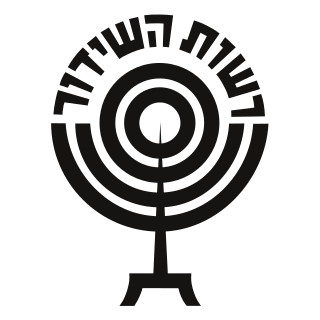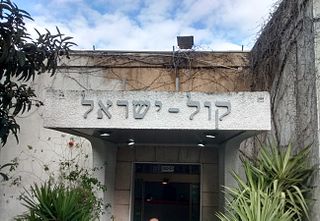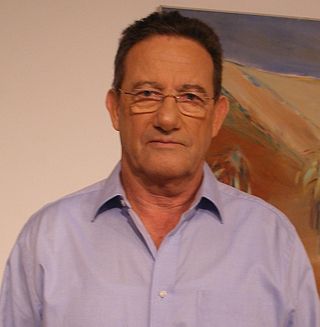
Telecommunications in Israel are the most developed in the Middle East. Israel's system consists of coaxial cables, optical fibers, and microwave radio relay. Prior to the 1990s, Israel's telecommunication market was dominated by Bezeq, a government-owned corporation. During the 1990s, the Israeli telecommunication industry transitioned from government owned monopolies to diversified private competition by a range of new companies. As of 2014, the telecommunications sector in Israel had revenues over ₪15 billion, representing about 2% of the GDP.

The Israel Broadcasting Authority was Israel's public broadcaster from 1948 to 2017, succeeded by the Israeli Public Broadcasting Corporation.

Television in Israel refers to television broadcasting services in the State of Israel, inaugurated on March 24, 1966. Initially, there was one state-owned channel, operated jointly by the Israel Broadcasting Authority and the Israeli Educational Television. In 1986, a second state-regulated channel was launched. This channel became a state-regulated commercial channel in 1993. An additional commercial channel was introduced in 2002, followed by the introduction of three commercial niche channels: an Israeli Russian-speaking channel, a channel of Israeli popular music and an Arabic-speaking channel. Colour transmissions were introduced gradually around 1977 and 1979. Multichannel cable television service became available to subscribers gradually since 1989, although illegal cable TV stations were present in the big cities during the 1980s. Satellite-based multichannel service has been available since 2000.

Haim Yavin is an Israeli television anchor and documentary filmmaker. He was one of Israel's leading news presenters, associated with the job for so many decades that he was known as "Mr. Television."

Kol Yisrael or Kol Israel was Israel's public domestic and international radio service. It operated as a division of the Israel Broadcasting Service from 1951 to 1965, and later the Israel Broadcasting Authority (IBA) from 1965 to 2017. Following the IBA's closure, the radio stations it used to administer are currently operated by the Israeli Public Broadcasting Corporation.
Channel 2, also called "The Second Channel" was an Israeli commercial television channel. It started doing experimental broadcasts funded by the television tax. The channel started commercial broadcasting on 4 November 1993 regulated and managed by The Second Authority for Television and Radio. In its first years, the channel was operated by three broadcasters, and in 2005 only two broadcasters were left while "Telad" stopped broadcasting due to its loss in the Second Authority's auction.
Middle East Television (METV) is a Christian satellite television broadcasting network located in Limassol, Cyprus. Programming on METV includes a mixture of Christian programming, plus non-religious entertainment programs like The Red Green Show, The Mary Tyler Moore Show, The Lone Ranger and NFL Football.
In linguistics and literature, periphrasis is the use of a larger number of words, with an implicit comparison to the possibility of using fewer. The comparison may be within a language or between languages. For example, "more happy" is periphrastic in comparison to "happier", and English "I will eat" is periphrastic in comparison to Spanish comeré.

Channel 1 was the second oldest television channel in Israel and one of five terrestrial channels in the country.

The Israeli Educational Television was a state-owned public terrestrial television network which used to concentrate on producing and broadcasting programs for school children.

Ron Ben-Yishai is an Israeli journalist. A veteran war correspondent, Ben-Yishai has covered many military conflicts in several different regions. In 2018, he won the Israel Prize, Israel's most prestigious civic honor.

MeHayom LeMahar was an Israeli current affairs news show, broadcast from 1994 to 2012 on Channel 1.

Ya'akov Eilon, a.k.a.Jacob Eilon, is an Israeli television presenter and journalist. Alongside Miki Haimovich, he was the anchor of Channel 2's HaHadashot 2 and Channel 10's Hadashot 10 news bulletins. Since 2019, Eilon presents the 5 pm IST edition of HaHadashot 13 on Reshet 13.

Miki Haimovich is an Israeli television presenter, former politician and veganism activist. She served as a member of the Knesset for Blue and White from 2019 to 2021.
Hevrat HaHadashot is one of the three major brands of Israeli television news programmes. Produced for Keshet 12 by Keshet Media Group subsidiary Israel Television News Company, a.k.a.HaHadashot 12. Its flagship evening news bulletin is broadcast at 8:00 p.m. IST, and anchored primarily by Yonit Levi and Danny Kushmaro. The company, originally the news department of Channel 2 – where its bulletins were known as HaHadashot 2 – was funded by Keshet Media Group and Reshet; Telad also funded the company until it lost time slots on Channel 2 in 2005.

Nitzan Chen is an Israeli journalist, author, and news manager. He is currently the Director of the Government Press Office (Israel) and has served as Chairman of the Israel Broadcasting Authority.

Yinon Magal is an Israeli journalist and politician. He served as a member of the Knesset for the Jewish Home for most of 2015, but resigned after accusations of sexual harassment, for which he ultimately was not charged.

Kan 11 is an Israeli state-owned free-to-air television channel. Operated by the Israeli Public Broadcasting Corporation (IPBC), it launched on 15 May 2017, replacing Channel 1 after the closure of the Israel Broadcasting Authority. It is one of the six free-to-air channels in the country.
HaHadashot, formerly HaHadashot 2, is the flagship, evening television news bulletin broadcast at 8 pm IST, produced by Israel Television News Company since 4 November 1993. It overtook the viewing rates of Mabat LaHadashot and became the most-watched news program in Israel. It usually lasts for fifty minutes.















